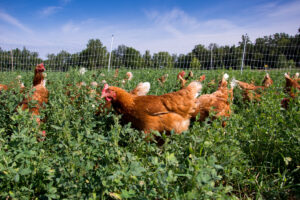We learn about evolution in school and it comes up frequently in daily life. An article here and there or a conversation with a friend might include a passing reference to the theory of evolution and what it means for a certain topic.
How often do you truly dig into the idea of evolution, though? Understanding how humanity (and all life, for that matter) came to be can help inform you about your own behavior and the behavior of those around you.
Further, a good grasp of evolution can give you a vast appreciation of the natural world and its wonders.
If you’re looking to boost your understanding of evolution, you’re in the right place. We’ve compiled seven of the best books about evolution that you can start reading and use to fill in the gaps in your understanding.
Let’s take a look.
 Check Amazon
Check Amazon- Written by a psychiatrist who examines human behavior from the perspective of collaboration rather than selfishness
- Provides an arguably more balanced picture of human nature
- Examines consciousness, reason, and other abstract capabilities of the human mind
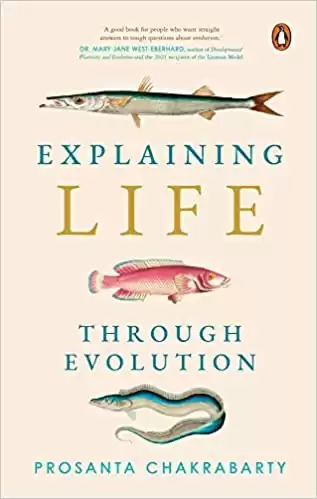 Check Amazon
Check Amazon- Situates humanity within the vast perspective of life on earth in this book
- Provides a comprehensive view of human evolution
- Details the evolution of life over four billion years
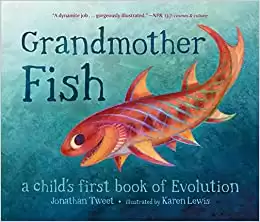 Check Amazon
Check Amazon- 40 pages
- Customers recommend this book for children ages 2 through 5
- Great treatment of evolution for young readers
- Full of illustrations
- Helpful science notes for parents (to help answer those inconvenient questions)
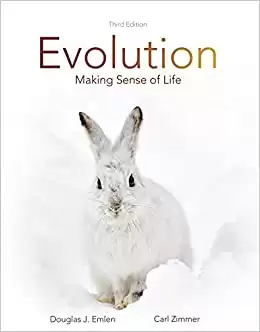 Check Amazon
Check Amazon- Great intro to evolution
- Mix of story-telling and hard facts
- Uses great case studies to illustrate the subject
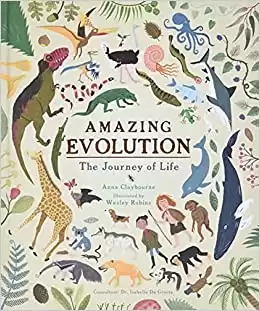 Check Amazon
Check Amazon- Enough of a mix of advanced and basic information that both adults and kids will enjoy
- Unique, enthralling explanations of under-explained subjects
- Great teaching tool for children on the subject of evolution
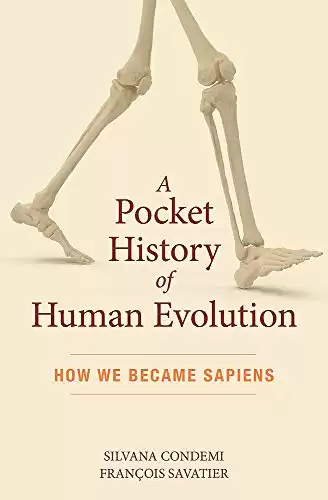 Check Amazon
Check Amazon- 160 pages.
- Learn precisely what scientists know about human evolution.
- Succinct treatment of the topic of evolution.
- Great starting point for readers wanting to learn more about evolution.
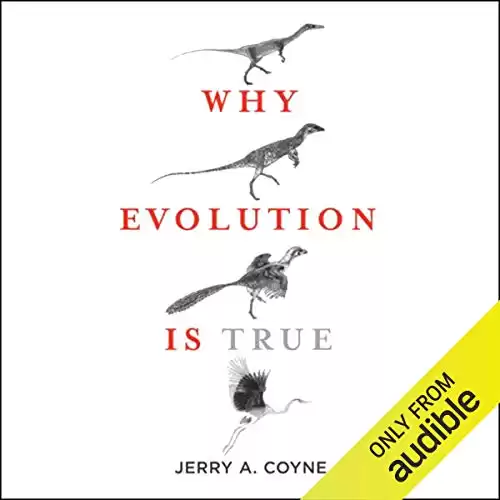 Check Amazon
Check Amazon- Covers the important arguments and debates that have been had regarding evolution
- This book will give you the points and details you need to better understand and explain the topic
- Provides various arguments proving the scientific validity of evolution
A-Z-Animals’ Top Picks for the Best Books on Evolution
1. Ape Mind, Old Mind, New Mind: Emotional Fossils and the Evolution of the Human Spirit by John Wylie
One of the flaws of basic evolution textbooks is that they paint a simplistic picture of human nature. One aspect of that picture is that people evolve with themselves in mind, ultimately leaning on self-preservation rather than collaboration.
Ape Mind, Old Mind, New Mind is a personal memoir written by a psychiatrist who examines human behavior from the perspective of collaboration rather than selfishness. He uses his experiences to argue that we are actually an altruistic species at heart, following that line of reasoning into questions about the origins of consciousness, reason, and more.
The book is available in Kindle and paperback formats. No critical reviews are available at this time.
Pros and Cons of Ape Mind, Old Mind, New Mind: Emotional Fossils and the Evolution of the Human Spirit by John Wylie
| Pros | Cons |
|---|---|
| This personal memoir was written by a psychiatrist who believes that human behavior is motivated by collaboration, not selfishness. | None |
| He believes that humas are an altruistic species and, following that line of reasoning, questions the origins of consciousness, reason, and more. | |
| This book is available in Kindle and paperback formats. |
- Written by a psychiatrist who examines human behavior from the perspective of collaboration rather than selfishness
- Provides an arguably more balanced picture of human nature
- Examines consciousness, reason, and other abstract capabilities of the human mind
2. Explaining Life Through Evolution by Prosanta Chakrabarty
Author Prosanta Chakrabarty situates humanity within the vast perspective of life on earth in this book. Detailing the four billion-year period in which life has developed on earth, Explaining Life Through Evolution gives the reader a clear idea of evolution, humanity, and how the two intersect.
Someone looking for a comprehensive view of human evolution will certainly benefit from this book. Rather than rote facts and details, Chakrabarty uses an interesting narrative to weave the scientific information included in any understanding of evolution.
This book is available in Kindle, hardcover, and paperback formats. The sole negative review said that the book was too defensive, had too few facts, and lacked depth, “The first 50 pages is all about “Trust Me”, irrelevant and repetitive. Next 50 pages has some interesting facts and interpretation, somewhat refreshing. Last 50 goes off into a different tangent and again goes into a defensive mode. Meaningless book overall! Sorry.”
Pros and Cons of Explaining Life Through Evolution by Prosanta Chakrabarty
| Pros | Cons |
|---|---|
| In this book, the author provides a clear picture of evolution, humanity, and how the two intersect. | A sole reviewer said that the book was too defensive, had too few facts, and lacked depth. |
| Chakrabarty utilizes interesting narrative to weave scientific information about evolution through the book. | |
| This title is available in Kindle, hardcover, and paperback formats. |
- Situates humanity within the vast perspective of life on earth in this book
- Provides a comprehensive view of human evolution
- Details the evolution of life over four billion years
3. Grandmother Fish: A Child’s First Book of Evolution by Jonathan Tweet (Author), Karen Lewis (Illustrator)
If you’re the parent of a new reader, Grandmother Fish is a perfect book to explain the basics of evolution.
The story informs children about the evolutionary tree of life, how it operates, and where it comes from. This is a complex idea for children to imagine, especially considering the fact that you can hardly ever see evolution in front of your eyes. But this book, which is available in Kindle and hardcover picture book formats, brings the concepts to life using vibrant artwork and engaging call-and-response text that will have your kid wiggling like a fish or hooting like a monkey.
This illustrated book that introduces the key points of evolution can be a great way to lay the foundation for your child. It also includes science notes that parents can use to answer any questions their child may ask.
A couple of reviewers said that the storyline was too simple and that it didn’t explain evolution in a meaningful way.
Pros and Cons of Grandmother Fish: A Child’s First Book of Evolution by Jonathan Tweet (Author), Karen Lewis (Illustrator)
| Pros | Cons |
|---|---|
| This book explains the evolutionary tree of life in a way that children can understand, including how it operates and how it originated. | A couple of reviewers said that the storyline was too simple and that it didn’t explain evolution in a meaningful way. |
| It’s available in Kindle and hardcover picture book formats. | |
| The book uses vibrant illustrations and engaging call-and-response text. | |
| It includes science notes that parents can use to answer their children’s questions. |
- 40 pages
- Customers recommend this book for children ages 2 through 5
- Great treatment of evolution for young readers
- Full of illustrations
- Helpful science notes for parents (to help answer those inconvenient questions)
4. Evolution — Making Sense of Life by Douglas J. Emlen and Carl Zimmer
This is the sole textbook on our list, but only because it’s an excellent introduction to evolution for those who aren’t familiar with it.
Expert writers, researchers, and scientists combine to weave storytelling and cold-hard facts about evolution in this textbook. Learn the fundamental principles all the way down to the nitty-gritty details of evolution. The book also utilizes case studies and relevant examples of evolution happening in our daily lives.
Learn everything you need to know with Evolution – Making Sense of Life. It’s available in eTextbook, paperback, and loose-leaf formats. The only negative reviews had to do with eTextbook format and useability issues.
Pros and Cons of Evolution — Making Sense of Life by Douglas J. Emlen and Carl Zimmer
| Pros | Cons |
|---|---|
| We included this, the only textbook on our list, because it provides such an excellent introduction to evolution. | The only negative reviews had to do with eTextbook format and useability issues. |
| The book combines storytelling with facts about evolution to teach fundamental principles as well as more in-depth knowledge. | |
| It also includes case studies and relevant examples of evolution that are occurring today. | |
| It’s available in eTextbook, paperback, and loose-leaf formats. |
- Great intro to evolution
- Mix of story-telling and hard facts
- Uses great case studies to illustrate the subject
5. Amazing Evolution: The Journey of Life by Anna Claybourne (Author), Wesley Robins (Illustrator)
Amazing Evolution: The Journey of Life is a perfect hybrid of comprehensive information about evolution and unique, enthralling details.
What better way to understand evolution than through the lens of curious cases, interesting relationships, long-needed explanations, and more? For example, what’s the connection between a cabbage and a capybara? Read the book and find out!
This beautifully illustrated book is only available in hardcover format. One reviewer said that the book was a little complex for younger kids, but that the child “still likes it.”
Pros and Cons of Amazing Evolution: The Journey of Life by Anna Claybourne (Author), Wesley Robins (Illustrator)
| Pros | Cons |
|---|---|
| This book is combines comprehensive information about evolution with engaging details. | It’s only available in hardcover format. |
| It helps readers understand evolution through curious cases, interesting relationships, and long-needed explanations. | One reviewer said that the book was a little complex for younger kids, but that the child “still likes it.” |
| This book is beautifully illustrated. |
- Enough of a mix of advanced and basic information that both adults and kids will enjoy
- Unique, enthralling explanations of under-explained subjects
- Great teaching tool for children on the subject of evolution
6. A Pocket History of Human Evolution: How We Became Sapiens by Silvana Condemi and François Savatier
For the human-centric reader, this book is the perfect fit. Learn precisely what scientists know about human evolution, from our shrub-dwelling ancestors of the Eocene to technological marvels of the 21st century.
A Pocket History of Human Evolution, as the name suggests, is also very succinct. That doesn’t mean it avoids the salient questions and details about human evolution, though. For example, do you know how crossbreeding between hominids influenced the creation of the human species? This book, which is available in Kindle, audiobook, and paperback formats, will tell you.
One negative review said that the material was fascinating and well-organized, but the writing is cumbersome in places. Another said that the authors made unsubstantiated opinions, while yet another called the book “superficial and speculative…[showing] deficiencies in the authors’ education.”
Pros and Cons of A Pocket History of Human Evolution: How We Became Sapiens by Silvana Condemi and François Savatier
| Pros | Cons |
|---|---|
| This book focuses solely on human evolution. | One negative review said that the material was fascinating and well-organized, but the writing is cumbersome in places. |
| It’s very succinct, but it covers the salient questions and details about human evolution. | Another said that the authors made unsubstantiated opinions, while yet another called the book “superficial and speculative…[showing] deficiencies in the authors’ education.” |
| This book is available in Kindle, audiobook, and paperback formats. |
- 160 pages.
- Learn precisely what scientists know about human evolution.
- Succinct treatment of the topic of evolution.
- Great starting point for readers wanting to learn more about evolution.
7. Why Evolution is True by Jerry A. Coyne
Why Evolution is True, which is available in Kindle and audiobook formats, covers the important arguments and debates that have held the study of evolution back in popular culture, detailing the specific things that disprove claims of its falseness.
Studying evolution through this lens allows you to get a deeper understanding of the process while equipping yourself with the knowledge needed to defend your trust in evolution should you ever need to. There are few things more frustrating than knowing something but failing to have the vocabulary to explain it.
This book will give you the points and details you need to better understand and explain evolution.
Further, if you’re on the fence about evolution or don’t understand it fully, this book will give you access to the vast bank of marvelous proof of its existence. It’s a win-win for any reader.
There were quite a few negative reviews disputing the “truth” of evolution, which, of course, is the very premise of this book. Since these reviews are extremely lengthy and detailed, we suggest that you peruse them before deciding whether this book is for you.
Pros and Cons of Why Evolution is True by Jerry A. Coyne
| Pros | Cons |
|---|---|
| This book covers the arguments and debates that have repressed the study of evolution in popular culture, detailing the specific things that disprove claims of the theory’s falseness. | This book is only available in Kindle and audiobook formats. |
| It provides the information you need to obtain a deeper understanding of evolution. | There were quite a few negative reviews disputing the “truth” of evolution, which, of course, is the very premise of this book. |
| The book also gives you the vocabulary you would require to defend your position supporting evolution should you ever need (or choose) to do so. | |
| It’s an excellent resource for anyone who is “on the fence” about evolution or doesn’t fully understand it. |
- Covers the important arguments and debates that have been had regarding evolution
- This book will give you the points and details you need to better understand and explain the topic
- Provides various arguments proving the scientific validity of evolution
How to Choose the Right Evolution Book
There are a lot of options above, and you might not know just where to start. Here’s a little guide for you to use if you’re not set on a book yet.
True Beginners: Amazing Evolution: The Journey of Life, Grandmother Fish, Evolution – Making Sense of Life.
- These books are geared toward those without advanced knowledge of evolution. Still, they cover all of the bases and use interesting examples, images, and stories to make the information entertaining. Grandmother Fish is a children’s book, but it certainly falls into this category.
Casual Learners: Why Evolution is True, A Pocket History of Human Evolution, Explaining Life Through Evolution
- These are thorough books that cover evolution in detail. They’re not overly difficult, though, so they’re accessible to someone who isn’t used to reading scientific material, for example.
Academic Reading: Ape Mind, Old Mind, New Mind
- This is the sole book on the list that is written for academics or individuals used to reading academic writing. Ideas of psychology, psychiatry, evolution, and more are interwoven.
The 7 Best Books About Evolution to Boost Your Understanding FAQs (Frequently Asked Questions)
What is the most famous book on evolution?
The most famous book about evolution is Charles Darwin’s The Origin of Species. The book is the flagship text in the study and understanding of evolution through natural selection.
We didn’t include The Origin of Species in our list because it’s a difficult read, geared toward scientists of the late 19th century.
What is the study of evolution called?
The study of evolution is called “evolutionary biology.” This discipline studies the taxonomies of species, factors that contribute to evolution, and the process of evolution over time including the present.
Is evolution just a theory?
Technically, evolution is a scientific theory, but that doesn’t have the same meaning as it would if you had a “theory” about something. A scientific theory can both be fact and theory, even though it isn’t deemed a “law.”
Laws must be reproducible and operate in the same manner in every instance. The Law of Gravity, for example, is easily demonstrable. Evolution is not as immediate or easy to reproduce, so it has yet to be “proven” in the sense that you could prove one of Newton’s Laws of Motion.
Still, the theory of evolution has been studied and used innumerable times without fail to describe and predict the processes and changes of life.
Thank you for reading! Have some feedback for us? Contact the AZ Animals editorial team.



